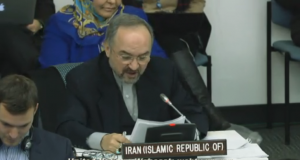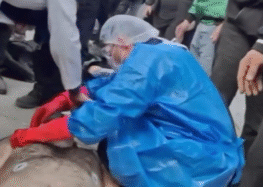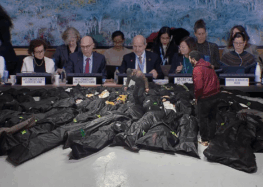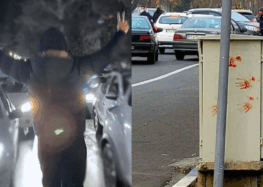UN Resolution Intensifies International Pressure on Iran

Iran’s ambassador to the UN, Mohammad Khazaee speaks at the UN prior to the vote. Although he attempted to discredit the resolution as “politically motivated,” His own lengthy speech was primarily a political statement and did not address any details of the human rights crisis in Iran.
Wide Margin of 83-to-31 Vote with Broad Cross-Regional Support
Resolution Calls for Release of Prisoners of Conscience
(November 27, 2012) The International Campaign for Human Rights in Iran welcomes today’s passage of a resolution by the United Nations Third Committee of the General Assembly calling on the government of Iran to stop its massive human rights violations.
The resolution passed with 83 votes in favor, 31 against, and 68 abstentions.
“This is a very important resolution in support of the Iranian people and is the least the international community can do in the face of the ongoing human rights crisis,” said Hadi Ghaemi, the Campaign’s spokesperson.
In addition to the recurring human rights violations cited in last year’s resolution, the current resolution specifically notes the “[o]ngoing, systematic, widespread and serious restrictions of freedom of peaceful assembly and association and freedom of opinion and expression, including through efforts to block or filter Internet content; restrict access to foreign e-mail services and a variety of websites; jam international satellite transmission into the Islamic Republic of Iran; censor or close newspapers, magazines and other publications; and cut access to communications and information.”
“The Iranian human rights community is under tremendous duress, as we can see since lawyer Nasrin Sotoudeh remains imprisoned for defending human rights activists, blogger Sattar Beheshti died during interrogations earlier this month, political prisoners still face severe prison conditions after unfair trials, and executions continue to skyrocket,” Ghaemi added.
Today’s resolution enjoyed broad cross-regional support, including that of Latin American and Caribbean countries. Barbados, Guatemala, Paraguay, and St. Kitts and Nevis all changed their votes to yes this year. The majority of Latin American states, including Argentina, Chile, El Salvador, Honduras, and Mexico, along with all members of the European Union, voted yes. Turkey again refrained from voting altogether. The positive votes included Libya, Japan, Bosnia and Herzegovina, and Colombia, as well as South Korea, Senegal, and Central African Republic.
The Brazilian representative gave an explanation of his country’s abstention, noting Brazil does not condone nor ignore the human rights violations in Iran, but believes securing Iran’s cooperation is urgently needed.
On the matter of free elections, today’s resolution included strong language “over the restrictions placed on candidates in the 2012 parliamentary elections, in particular restrictions on the eligibility and activities of candidates. . . .” The resolution also “[s]trongly urge[d] the Government of the Islamic Republic of Iran to ensure free, fair, transparent and inclusive presidential elections in 2013 that reflect the will of the people” and called for Iran to allow “international experts and journalists to freely observe and report on the elections. . . .”
In addition, UN member states “Expresse[d] particular concern at the failure the Government of the Islamic Republic of Iran to conduct comprehensive investigations or to launch an accountability process in response to cases of serious human rights violations involving the Iranian judiciary and security agencies and to the widespread violations in the period following the presidential elections of 2009 in Kahrizak prison and elsewhere. . . .”
The resolution “continue[d] to call upon the Government of the Islamic Republic of Iran to immediately and unconditionally release all those who have been arbitrarily arrested and detained for simply exercising their right to peaceful assembly and participating in peaceful protests about political, economic, environmental or other issues, including the conduct and results of the 2009 presidential election. . . .”
Regarding the treatment of prisoners, the resolution pressed the Iranian government on its violations of due process and of the rights of detainees, including, among several other issues, “the denial of access to medical treatment as well as persistent reports of detainees dying in custody,” as in the death last month of blogger Sattar Beheshti , or the deteriorating health of imprisoned journalist Ahmad Zeidabadi.
The resolution also highlighted the “continuing alarming high frequency in the carrying out of the death penalty in the absence of internationally recognized safeguards,” as well as the continued practice of public executions and secret group executions.
Today’s passage of the resolution marks the ninth consecutive year the General Assembly has cited Iran’s dramatic failure to abide by its human rights obligations and urged cooperation with UN authorities to address these failures. The resolution again called for cooperation with Special Rapporteur on the situation of human rights in Iran Ahmad Shaheed, who has not yet been allowed to enter the country even though he is now several months into the second year of his mandate. In recent years, Iran has continued to thwart all international efforts to assist in improving its human rights record.
Prior to the vote, Iran’s ambassador to the UN Mohammad Khazaee gave a lengthy speech impugning Canada, which submitted the draft resolution, and many of the countries which co-sponsored it. He insisted that the resolution had “more than 150 unsubstantiated allegations” against Iran, but refused to identify them. Instead, Khazaee used his speech to accuse the resolution’s co-sponsors of political motives against Iran.
The Campaign welcomes the wide-reaching, cross-regional and global support for the resolution and urges Iran to cooperate with the United Nations to address the concerns it raises.
The UN General Assembly will adopt the resolution formally in December.






